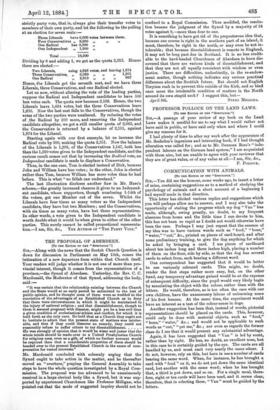THE PROPOSAL OF ABERDEEN.
(To THE EDITOR OF THE "SPECTATOR.")
So.,—Along with the news that the Scotch Church Question is down for discussion in Parliament on May 13th, comes the intimation of a new departure from within that Church itself. Your readers will judge whether it is not one of more than pro- vincial interest, though it comes from the representatives of a province,—the Synod of Aberdeen. Yesterday, the Rev. C. C.
Macdonald, the Moderator of that Synod, addressing the body, said :-
"It was certain that the relationship existing between the Church -and the State would at an early period be submitted to the test of public opinion, and he thought none of them were so wedded to the conviction of the advantages of an Established Church as to deny that there were circumstances in which it might be maintained to the injury of national religion ; and that disestablishment, though to them it seemed pregnant with disaster, might yet be a less evil than a given condition of ecclesiastical schism and conflict, for which it is held forth as the only cure. He held that as a Church they ought not to hesitate to admit that the present state of matters was intoler- able, and that if they could discover no remedy, they could not
reasonably refuse to suffer others to try disestablishment He was strongly of opinion that it would be wiser and juster that the whole teinds should be made over to a United Presbyterian Church for religious uses, even as a gift, of which no further account would be required than that a considerable proportion of them should be handed over to the present Established Church in the name of com- pensation for vested interests."
Mr. Macdonald concluded with solemnly urging that the Synod ought to take action in the matter, and he thereafter moved an "overture," praying the General Assembly to take steps to have the whole question investigated by a Royal Com- mission. The proposal was too advanced to be unanimously received in a large clerical body like a Synod, but it was sup- ported by experienced Churchmen like Professor Milligan, who pointed-out that the mode of suggested inquiry should not be
confined to a Royal Commission. Thus modified, the resolu- tion became the judgment of the Synod by a majority of 34 votes against 8,—more than four to one.
It is something to have got rid of the preposterous idea that, because one course is right in the southern part of an island, it must, therefore, be right in the north, or may even be not in- tolerable ; that because disestablishment is remote in England, it may not be long past due in Scotland. It is no less credit- able to the hard-headed Churchmen of Aberdeen to have dis- covered that there are various kinds of disestablishment, and that they are not all equally consistent with wisdom or even justice. There are difficulties, undoubtedly, in the re-endow- ment matter, though nothing indicates any serious practical difference about the Scottish future. But should not English Toryism rush in to prevent this suicide of the Kirk, and so bind once more the intolerable condition of matters in the North around its own stupid neck P I suggest this, but—


































 Previous page
Previous page